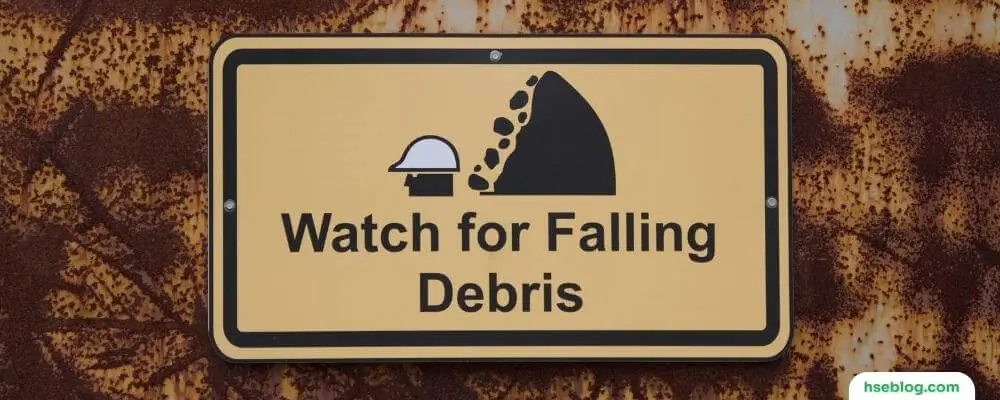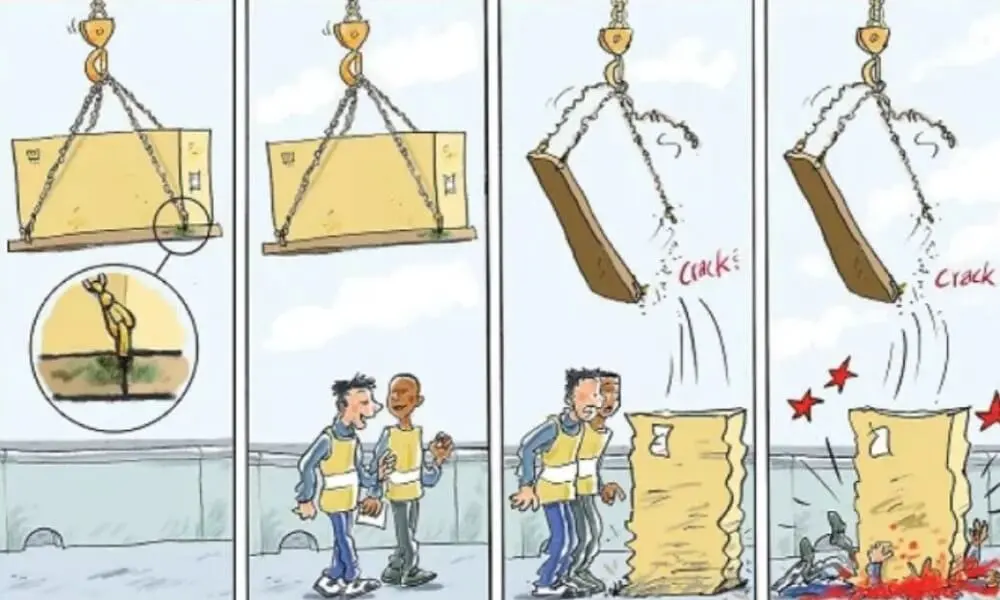Workplace safety is paramount in every industry, and understanding the factors contributing to a safe work environment is crucial for employers and employees. Near misses, also known as close calls or near accidents, could have led to injury, illness, or damage but fortunately did not. Timely reporting of near misses can help organizations identify potential hazards, implement preventive measures, and improve overall safety.
However, research has shown that many workers do not report near misses, which leaves organizations vulnerable to accidents and injuries. In this blog post, we will explore the top 9 reasons workers don’t report near misses and discuss what employers can do to create a more open and proactive safety culture. By understanding these factors, organizations can take steps to encourage workers to report near misses, leading to a safer and more productive work environment.
Definition & The Importance Of Reporting Near Misses
Near misses, also called close calls or near accidents, are unplanned events or incidents that do not result in injury, illness, or damage but have the potential to do so. These occurrences can warn that something is amiss in the workplace, indicating that existing safety measures may need to be reviewed or new ones implemented.
Importance of Reporting Near Misses
Reporting near misses is extremely important as it helps organizations identify potential hazards or weaknesses in their processes before an actual incident occurs. Near misses are incidents that did not result in injury, damage, or loss but had the potential to do so. By reporting near misses, organizations can investigate the underlying causes and take corrective actions to prevent similar incidents from happening in the future.
Here are some reasons why reporting near misses is important:
- Identify potential hazards: Near misses can help organizations identify hazards that must be addressed to prevent future accidents. Organizations can identify the underlying causes by analysing near misses and taking corrective actions before an incident occurs.
- Improve safety culture: Reporting near misses can improve an organisation’s safety culture by encouraging employees to speak up about potential hazards and safety concerns. This creates a culture of open communication and empowers employees to take ownership of safety.
- Reduce costs: By addressing potential hazards identified through near misses, organizations can reduce costs associated with accidents, such as property damage, lost productivity, and workers’ compensation claims.
- Compliance with regulations: Reporting near misses can help organizations comply with regulatory requirements related to safety and health.
- Continuous improvement: Analyzing near misses can help organizations identify opportunities for continuous improvement in their processes and procedures, leading to a safer and more efficient workplace.
Overall, reporting near misses is a proactive approach to identifying potential hazards and improving safety in the workplace. It helps organizations create a safety and continuous improvement culture, ultimately leading to a safer and more productive workplace for all.

9 Reasons Why Workers Don’t Report Near Misses
There are several reasons why workers may not report near misses in the workplace. Here are some possible explanations:
1. Fear Of Repercussions
A primary reason why workers may not report near misses is the fear of repercussions, both from management and their peers. This can manifest in various ways:
- Disciplinary action: Workers may worry that admitting to a near miss could lead to disciplinary actions, such as written warnings, demotions, or even termination. This fear can cause them to avoid reporting the incident to protect their job and reputation.
- Blame culture: In some workplaces, a culture of blame may make workers hesitant to report near misses. They may worry about being singled out, shamed, or criticized for their role in the incident, even if it was unintentional or due to systemic issues.
- Impact on performance evaluations: Workers may be concerned that reporting near misses will negatively affect their performance evaluations, reducing promotion opportunities or raises. They may feel that admitting to a near miss is an admission of incompetence or carelessness.
To address these issues, employers should consider the following strategies:
- Encourage a no-blame culture: Employers should emphasize that the primary goal of reporting near misses is to learn from them and improve workplace safety rather than assigning blame. This can be reinforced through policies, training, and open communication about the importance of reporting incidents without fear of negative consequences.
- Anonymous reporting: Allowing workers to report near misses anonymously can help alleviate fears of retaliation or blame. This can encourage more open and honest reporting of incidents.
- Reinforce the importance of reporting: Employers should regularly communicate the benefits of reporting near misses, such as preventing future accidents and improving overall safety. This can help workers understand that reporting is in their best interest and the interest of their colleagues.
- Lead by example: Management should demonstrate a commitment to safety by openly discussing near misses and encouraging workers to report incidents without fear of repercussions. A supportive and proactive approach from leadership can help create an environment where workers feel safe to report near misses.
By addressing the fear of repercussions and creating a supportive reporting culture, employers can encourage workers to report near misses, leading to a safer and more productive work environment.
2. Lack Of Awareness
Another reason why workers may not report near misses is a lack of awareness about the importance of reporting these incidents and their potential consequences. This lack of awareness can stem from several factors:
- Insufficient training: Workers may not have received adequate training on the importance of reporting near misses, leading them to underestimate their significance. They may not understand the potential hazards that can arise from unreported near misses or the role they play in preventing future accidents.
- Misunderstanding the definition: Some workers might not fully understand what constitutes a near miss. They may mistakenly believe that only incidents resulting in injuries or property damage need to be reported, overlooking situations where accidents were narrowly avoided.
- Underestimating the benefits: Workers may not be aware of the benefits that come from reporting near misses, such as identifying patterns of unsafe behavior or conditions, learning from mistakes, and proactively addressing potential hazards before they escalate.
To tackle the issue of lack of awareness, employers should consider the following strategies:
- Comprehensive training: Provide regular and thorough training on workplace safety, which includes a clear explanation of what constitutes a near miss and why reporting them is essential. This training should be mandatory for all employees and conducted periodically to reinforce its importance.
- Ongoing communication: Employers should consistently communicate the value of reporting near misses, emphasizing their role in preventing accidents and improving overall safety. This can be done through meetings, newsletters, safety bulletins, or other communication channels that reach all workers.
- Sharing success stories: Highlight instances where near miss reporting has led to positive changes in the workplace, such as identifying and correcting hazardous conditions or behaviors. By sharing these success stories, workers can see the tangible benefits of reporting near misses and understand their impact on workplace safety.
- Visible commitment from leadership: Management should demonstrate their commitment to safety by actively participating in safety training, discussing near misses openly, and showing support for workers who report incidents. This can help create a culture where workers feel encouraged and empowered to report near misses.
By enhancing awareness and delivering essential education and resources, employers can foster an environment in which employees recognize the significance of reporting near misses, thereby increasing the likelihood of such reporting and ultimately bolstering workplace safety.

3. Unclear Reporting Procedures
Unclear or complicated reporting procedures can also discourage workers from reporting near misses. This can include procedures that are difficult to understand, involve excessive paperwork, or require multiple steps. Some workers may feel that the reporting process is too time-consuming or burdensome, leading them to forego reporting the incident altogether.
To overcome this issue, employers should consider the following strategies:
- Simplify reporting procedures: Employers should review and streamline their reporting procedures as much as possible, making them clear and easy to follow. This can include simplifying paperwork or creating an online reporting system.
- Provide clear guidance: Employers should provide clear instructions on reporting near misses, including who to contact and what information to include. This information should be readily available to all employees.
- Offer training: Provide training on reporting procedures to ensure that workers understand how to report incidents and know the benefits of doing so. This training should include information on the reporting process and the importance of reporting near misses.
- Encourage reporting: Employers should communicate the importance of reporting near misses and their impact on workplace safety. This can be done through regular safety communications or by offering incentives for reporting incidents.
- Monitor and evaluate: Employers should regularly monitor the reporting process to identify any issues or areas for improvement. This can include reviewing the effectiveness of reporting procedures or seeking employee feedback on the reporting process.
By simplifying reporting procedures, providing clear guidance, and encouraging reporting, employers can create a culture where workers feel confident in reporting near misses. This can help identify potential hazards and prevent future accidents, leading to a safer and more productive workplace.
4. Time Constraints
Workers may also not report near misses due to time constraints. They may feel that taking the time to report an incident could negatively impact their productivity or that of their colleagues. Additionally, workers may not report near misses if they feel that their workload is already too heavy or if they feel that they do not have the necessary resources to report the incident effectively.
To address this issue, employers should consider the following strategies:
- Streamline reporting procedures: As previously mentioned, simplifying reporting procedures can reduce the time required to report near misses. Employers should aim to create an efficient and straightforward reporting process that minimizes the impact on workers’ productivity.
- Provide resources: Employers should provide workers with the necessary resources to report near misses effectively. This can include access to reporting tools or online reporting systems and training on using them effectively.
- Encourage prompt reporting: Employers should encourage workers to report near misses as soon as possible rather than waiting until later. This can help prevent the incident from escalating and can help to identify any hazards that may require immediate attention.
- Recognize reporting efforts: Employers should recognize workers who report near misses, highlighting the value of their efforts in improving workplace safety. This can encourage more workers to report incidents promptly and help create a culture where reporting is an essential part of the job.
- Address workload concerns: Employers should address any workload concerns that workers may have, providing the necessary resources or support to ensure they can report incidents promptly without negatively impacting their productivity.
By tackling the challenge of time limitations and supplying the required resources, employers can cultivate an atmosphere in which employees feel encouraged to swiftly report near misses. This proactive approach can aid in averting accidents and enhancing overall safety within the workplace.

5. Perceived Insignificance
Another reason why workers may not report near misses is the perception that the incident is not significant enough to warrant reporting. Workers may believe that a near miss is not important enough to report, especially if no one was hurt or no property damage occurred. However, near misses can often be indicators of underlying hazards that need to be addressed to prevent future accidents.
To address this issue, employers should consider the following strategies:
- Educate workers on the importance of reporting all near misses: Employers should communicate to workers that reporting all near misses is crucial for identifying potential hazards and improving workplace safety. They should explain that a near miss that may seem insignificant on its own could be part of a larger pattern of unsafe behaviour or conditions that could lead to a more severe incident in the future.
- Develop a reporting culture: Employers should create a culture where reporting near misses is the norm, and workers understand the importance of doing so. This can be achieved through regular communication and training on near miss reporting and recognition for workers who report incidents.
- Provide feedback: Employers should provide feedback to workers who report near misses, letting them know their report has been received and acknowledged. This feedback can include information on any changes made as a result of the report, highlighting the impact their reporting has had on improving workplace safety.
- Provide a reporting platform: Employers should provide an easy-to-use reporting platform where workers can report near misses anonymously. This can encourage workers to report incidents without fear of negative consequences.
Encouraging workers to report all near misses and incidents promptly can be achieved through various methods such as educating them on the significance of reporting, developing a reporting culture, providing feedback, and implementing an easy-to-use reporting platform.
By implementing these strategies, employers can address the issue of perceived insignificance, and create an environment where workers feel comfortable reporting all incidents, ultimately improving safety in the workplace.
6. Bystander Effect
The bystander effect is a psychological phenomenon where individuals are less likely to report an incident if others are present. This can occur in the workplace when multiple workers witness a near miss, and assume that someone else will report it. As a result, no one takes responsibility for reporting the incident, and it goes unreported.
To address this issue, employers should consider the following strategies:
- Train workers on the bystander effect: Employers should educate workers on the bystander effect and how it can impact reporting near misses. Workers should understand that assuming someone else will report an incident can lead to it going unreported, putting everyone at risk.
- Encourage individual responsibility: Employers should emphasize the importance of individual responsibility for reporting near misses. Workers should understand that they are not responsible for reporting incidents they did not witness, and they should not assume that someone else will report them.
- Foster a culture of reporting: Employers should create a culture where reporting near misses is encouraged and viewed as an essential part of the job. Workers should understand that reporting incidents is a responsibility they share and should feel empowered to do so.
- Provide clear reporting procedures: Employers should provide clear reporting procedures so workers know how and where to report incidents. This can help eliminate confusion and reduce the likelihood of someone assuming someone else will report it.
- Provide anonymous reporting options: Employers should provide anonymous reporting options so workers feel comfortable reporting incidents without fear of retaliation or blame. This can help ensure all incidents are reported, even if workers are concerned about negative consequences.
By raising awareness about the bystander effect, promoting personal accountability, nurturing a reporting culture, establishing transparent reporting protocols, and facilitating anonymous reporting avenues, employers can tackle the bystander effect issue and guarantee timely reporting of near misses. This proactive strategy can contribute to averting potential accidents and elevating overall safety within the workplace.

7. Inadequate Feedback
Workers may be discouraged from reporting near misses if they do not receive adequate feedback on their reports. Workers may feel that their report was ignored or that no action was taken, leading them to believe that their reporting efforts were ineffective.
To address this issue, employers should consider the following strategies:
- Provide prompt feedback: Employers should provide prompt feedback to workers who report near misses, acknowledging their report and letting them know it has been received. Workers should be informed about any changes made due to their report, highlighting the impact their reporting has had on improving workplace safety.
- Provide constructive feedback: Employers should provide constructive feedback to workers who report near misses, letting them know how they can improve their reporting efforts in the future. This can include suggestions for providing more detailed reports or reporting incidents more promptly.
- Communicate follow-up actions: Employers should communicate any follow-up actions taken due to the reported incident. Workers should understand that their report has led to positive changes in the workplace, and they should be informed about any steps that have been taken to prevent future incidents.
- Recognize reporting efforts: Employers should recognize and acknowledge workers who report near misses, highlighting the value of their reporting efforts in improving workplace safety. This can be done through public recognition, incentives, or other means of acknowledgement.
Employers can ensure that workers feel their reporting efforts are appreciated and effective by providing prompt and constructive feedback, communicating follow-up actions, and recognizing reporting efforts.
8. Lack Of Trust In The Reporting Process
Workers may not report near misses without trust in the reporting process. This can occur if workers believe that their report will not be taken seriously or that no action will be taken. It can also occur if workers do not trust their employer or management to address the reported incident effectively.
To address this issue, employers should consider the following strategies:
- Create an open and transparent reporting process: Employers should create an open and transparent reporting process where workers understand how incidents are reported, investigated, and addressed. This can help build trust in the reporting process and reassure workers that their reports will be taken seriously.
- Provide regular updates: Employers should update workers on the status of reported incidents, highlighting any actions taken. Workers should be informed about any changes or improvements, which can help build trust in the reporting process.
- Foster a culture of trust: Employers should create a culture where workers feel comfortable reporting incidents and trust that their reports will be addressed effectively. This can be achieved through open communication, transparency, and recognition for reporting efforts.
- Address concerns promptly: Employers should promptly address any concerns workers have about the reporting process, ensuring they feel that their concerns are heard and addressed. This can help build trust in the reporting process and create a culture where workers feel comfortable reporting incidents.
- Involve workers in the process: Employers should involve workers in the reporting process, providing them with opportunities to provide feedback on the process and suggesting improvements. This can help create a culture of ownership and trust in the reporting process.
To overcome the problem of a lack of trust in the reporting process, employers can take several measures such as establishing an open and transparent reporting process, providing frequent updates, promoting a culture of trust, promptly addressing concerns, and engaging workers in the process. These actions can help employers to build a more robust reporting system that is effective and trusted by their employees.

9. Peer Pressure Or Workplace Culture
Workers may feel pressured by colleagues or supervisors not to report near misses. This can occur in a workplace where reporting incidents is viewed as a negative reflection on the workers or where there is a culture of blame and punishment. In these situations, workers may feel that reporting incidents could lead to negative consequences, such as disciplinary action or loss of reputation.
To address this issue, employers should consider the following strategies:
- Foster a culture of openness and transparency: Employers should create a culture where workers feel comfortable reporting incidents without fear of negative consequences. This can be achieved through open communication, transparency, and focusing on learning from incidents rather than placing blame.
- Provide support for reporting: Employers should provide support for workers who report near misses, such as offering counselling services or other resources to help workers cope with the stress of reporting an incident.
- Encourage reporting: Employers should encourage workers to report incidents and communicate the benefits of doing so. Workers should understand that reporting incidents is a valuable part of improving workplace safety and that it is not a negative reflection on their abilities or performance.
- Offer anonymous reporting options: Employers should offer anonymous reporting options, so workers feel comfortable reporting incidents without fear of retaliation or blame. This can help ensure that all incidents are reported, even if workers are concerned about negative consequences.
- Address workplace culture: Employers should address any negative workplace culture or peer pressure that may discourage reporting near misses. This can be achieved through training, communication, and a focus on creating a supportive and transparent workplace culture.
Creating an environment of openness and transparency, promoting the availability of support for reporting, and encouraging reporting by providing anonymous reporting options can help employers tackle the problem of peer pressure or workplace culture that might discourage reporting near misses. Additionally, addressing workplace culture can also be helpful in this regard.
Conclusion
Reporting near misses is essential for identifying potential hazards and improving workplace safety. However, there are many reasons why workers may not report incidents, such as fear of retaliation, time constraints, perceived insignificance, or lack of trust in the reporting process. It is crucial for employers to address these issues and create a culture where reporting incidents is viewed as a valuable part of the job.

